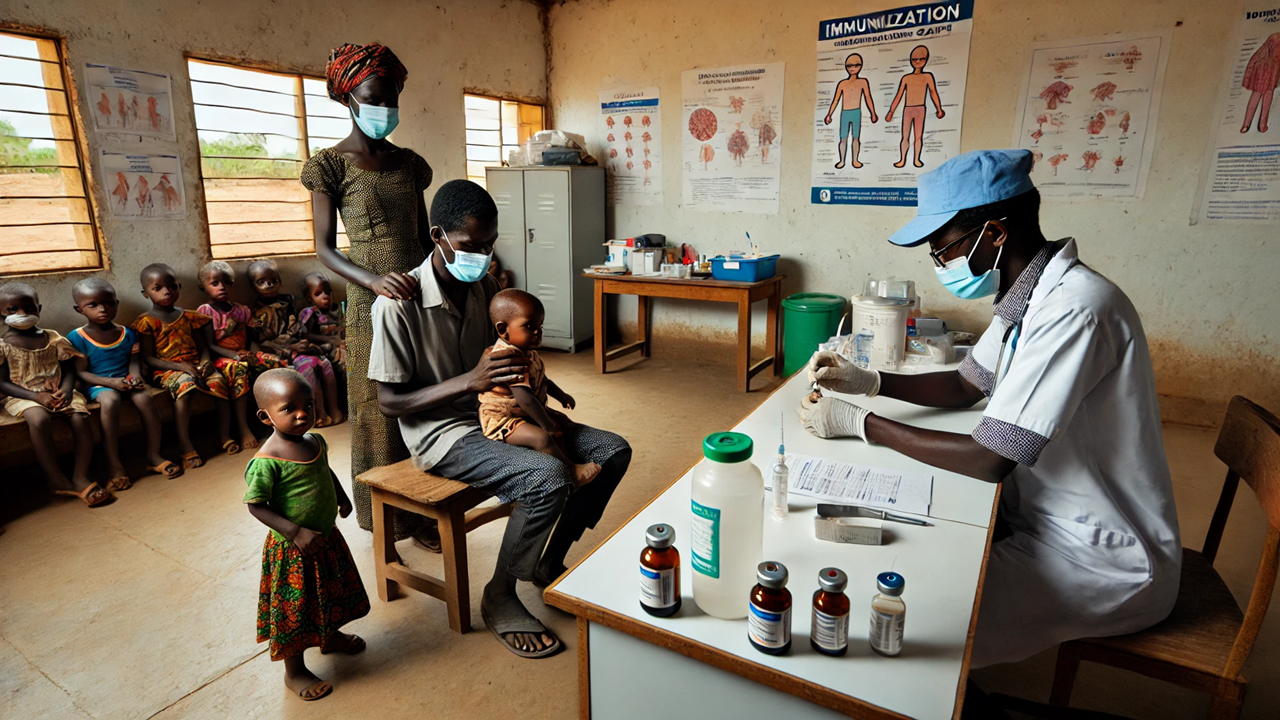Nigeria Launches Historic Integrated Vaccination Drive to Protect 106 Million Children
The integrated vaccination drive will reach children aged 0–14 years for measles and rubella and children aged 0–59 months for polio.

- Country:
- South Africa
In one of the most ambitious public health initiatives in its history, Nigeria has begun a nationwide integrated vaccination campaign that aims to immunize 106 million children against measles, rubella, and poliomyelitis, while also delivering a range of vital child health services. The campaign, which officially launched today, marks a major step in strengthening Nigeria’s health system and moving closer to the universal health coverage goals set out under the government’s “Primary Health Care Under One Roof” strategy.
Largest-Ever Integrated Health Campaign
The integrated vaccination drive will reach children aged 0–14 years for measles and rubella and children aged 0–59 months for polio. It will unfold in two phases — the first phase, beginning this week, will target 20 high-risk northern states and Oyo state in the southwest, while the second phase, scheduled for January 2026, will extend coverage to the remaining southern states.
This monumental public health effort combines multiple vaccines and essential health services in a single coordinated delivery model, improving efficiency and ensuring that every child — regardless of location — is reached.
Health workers will operate through a three-tier system comprising fixed health posts, temporary outreach stations, and house-to-house “sweep teams”. This design ensures accessibility even for children in hard-to-reach rural and conflict-affected areas, reflecting Nigeria’s commitment to “leave no child behind.”
A Holistic Approach to Child Health
In addition to administering vaccines against measles, rubella, and polio, the campaign integrates routine immunization, malaria prevention, and treatment for neglected tropical diseases (NTDs). In high-risk regions, seasonal malaria chemoprevention (SMC) will be offered to children under five, helping to reduce mortality rates linked to preventable diseases.
The integrated model supports Nigeria’s Health Campaign Effectiveness (HCE) initiative, which promotes a collaborative, multi-sectoral approach to disease prevention. The strategy ensures that interventions are both cost-effective and community-centred, maximizing the impact of limited health resources.
Responding to Persistent Disease Threats
Nigeria’s renewed vaccination effort comes in response to persistent outbreaks of circulating variant poliovirus type 2 (cVDPV2) and measles across the country and neighbouring regions of the Lake Chad Basin. To combat this, Nigeria is working closely with Cameroon, Chad, Niger, and the Central African Republic under a cross-border coordination plan aimed at halting active outbreaks by the end of 2025 and eliminating residual transmission risks by 2026.
Dr Ali Pate, Minister of Health and Social Welfare, hailed the campaign as a crucial moment for national unity and public health:
“On behalf of the Government, I want to express our deep respect and gratitude to Nigeria’s frontline health workers for their unwavering dedication. I urge you to approach this campaign with the same resilience and commitment you have shown over the years. As a parent myself, I know that no parent would ever refuse something that protects their child. Vaccines are safe, and they save lives.”
Building on Recent Successes
The new campaign follows the success of two “In-between Round Activities” held between August and September 2025 across 11 northern states. These activities reached over 3.1 million children with vaccines, distributed nutritional supplements to 500,000 malnourished children, and delivered anti-malaria medication to 150,000 children.
This progress demonstrates the growing effectiveness of Nigeria’s integrated health delivery model, which merges immunization, nutrition, and disease prevention into unified campaigns.
Strengthening Systems and Accountability
To ensure the smooth rollout of this massive initiative, Nigeria has strengthened its logistical and data systems. Training programmes for vaccinators and supervisors have been scaled up nationwide, while payment systems for frontline workers have been restructured to improve transparency and efficiency.
New digital tools are also being deployed to ensure that each vaccinated child is recorded in real-time, improving data integrity and accountability. These systems will help the government monitor coverage gaps, evaluate performance, and ensure that no child is left unprotected.
A New Combined Vaccine for Better Protection
The campaign also marks the introduction of a new combined measles-rubella (MR) vaccine, replacing the previous measles-only dose. This development reflects Nigeria’s ongoing commitment to aligning with global vaccination standards.
Measles, one of the most contagious human diseases, remains a leading cause of death among young children globally — especially those who are malnourished or unvaccinated. Rubella, though milder, can cause Congenital Rubella Syndrome (CRS) — a condition leading to severe birth defects in babies born to infected mothers. The MR vaccine will thus play a vital role in safeguarding both children and mothers.
Global Support and Coordination
The government-led campaign is being implemented with strong support from international partners including the World Health Organization (WHO), UNICEF, Gavi, the Vaccine Alliance, Rotary International, the Bill & Melinda Gates Foundation, the Africa Centres for Disease Control and Prevention (Africa CDC), civil society organizations, and traditional and religious leaders.
Dr Mohammed Janabi, WHO Regional Director for Africa, commended Nigeria’s leadership:
“Nigeria’s integrated approach sets a strong example for the Region. By uniting efforts against measles, rubella, and polio, and by working hand-in-hand with communities and partners, we are moving closer to the day when no African child suffers or dies from these preventable diseases.”
A Vision of a Polio-Free, Healthier Nigeria
Through this campaign, Nigeria aims not only to eliminate measles, rubella, and polio, but also to strengthen its primary health care system and advance its universal health coverage ambitions.
The integration of disease prevention, data-driven planning, and community engagement represents a new era in public health delivery — one that prioritizes collaboration, innovation, and inclusivity.
As the campaign unfolds, millions of families across Nigeria will benefit from improved access to life-saving vaccines and essential health services — a decisive step toward a future where every child grows up healthy, safe, and protected.










